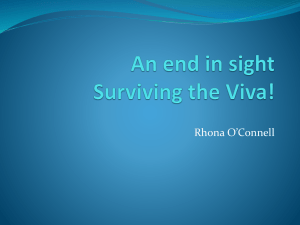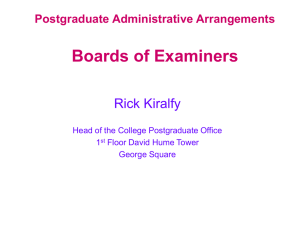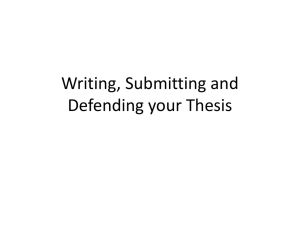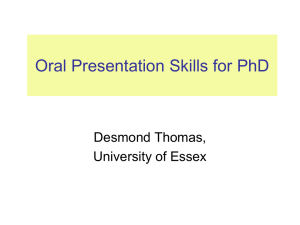I have been reading for my PhD in population genetics... have been examining the possible differences in origin for the... Janet’s appeal
advertisement
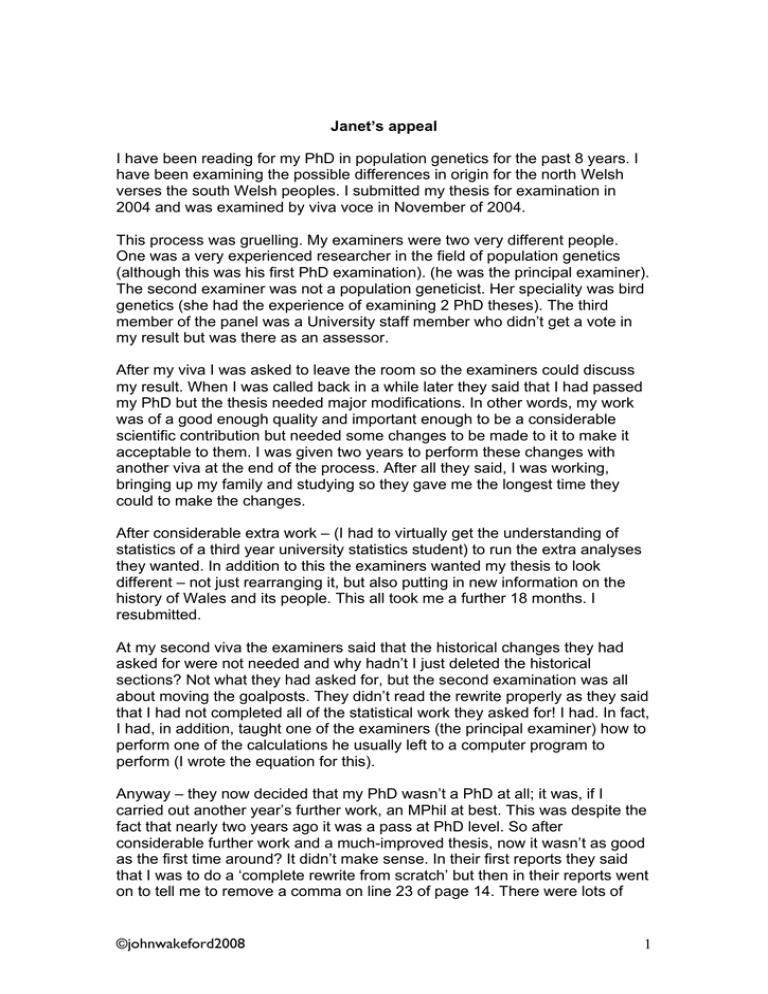
Janet’s appeal I have been reading for my PhD in population genetics for the past 8 years. I have been examining the possible differences in origin for the north Welsh verses the south Welsh peoples. I submitted my thesis for examination in 2004 and was examined by viva voce in November of 2004. This process was gruelling. My examiners were two very different people. One was a very experienced researcher in the field of population genetics (although this was his first PhD examination). (he was the principal examiner). The second examiner was not a population geneticist. Her speciality was bird genetics (she had the experience of examining 2 PhD theses). The third member of the panel was a University staff member who didn’t get a vote in my result but was there as an assessor. After my viva I was asked to leave the room so the examiners could discuss my result. When I was called back in a while later they said that I had passed my PhD but the thesis needed major modifications. In other words, my work was of a good enough quality and important enough to be a considerable scientific contribution but needed some changes to be made to it to make it acceptable to them. I was given two years to perform these changes with another viva at the end of the process. After all they said, I was working, bringing up my family and studying so they gave me the longest time they could to make the changes. After considerable extra work – (I had to virtually get the understanding of statistics of a third year university statistics student) to run the extra analyses they wanted. In addition to this the examiners wanted my thesis to look different – not just rearranging it, but also putting in new information on the history of Wales and its people. This all took me a further 18 months. I resubmitted. At my second viva the examiners said that the historical changes they had asked for were not needed and why hadn’t I just deleted the historical sections? Not what they had asked for, but the second examination was all about moving the goalposts. They didn’t read the rewrite properly as they said that I had not completed all of the statistical work they asked for! I had. In fact, I had, in addition, taught one of the examiners (the principal examiner) how to perform one of the calculations he usually left to a computer program to perform (I wrote the equation for this). Anyway – they now decided that my PhD wasn’t a PhD at all; it was, if I carried out another year’s further work, an MPhil at best. This was despite the fact that nearly two years ago it was a pass at PhD level. So after considerable further work and a much-improved thesis, now it wasn’t as good as the first time around? It didn’t make sense. In their first reports they said that I was to do a ‘complete rewrite from scratch’ but then in their reports went on to tell me to remove a comma on line 23 of page 14. There were lots of ©johnwakeford2008 1 examples of such requests not what you would expect to see if you have to rewrite from scratch. All of us misunderstood the complete rewrite from scratch request – my two academic supervisors and myself. Both of my vivas were upsetting processes. The examiners pulled my PhD apart and had left no room for misunderstanding when they told me that it was not up to the required standards. When I subsequently spoke to a colleague he said that being in viva could be likened to being the parent of a particularly ugly child; you know that your child is ugly but you don’t appreciate anyone telling you just how ugly it is! He is correct! It is a horrible process. Unfortunately in the first version of my thesis I had criticised one of the papers that had been published by one of my peers. In this paper the authors had taken a sample of 96 men from one village in north Wales and called it a Welsh sample. To my shock this is the usual mode of sampling in this field. I was highly critical of these methods slating them for being unscientific. Indeed I remarked that this paper was ‘fundamentally flawed’. Unfortunately one of my examiners (the principal examiner) was a co-author of this paper. He did not take my criticisms too kindly. As a result he was very aggressive in his examination of my work. (A salutary lesson here, if you can – avoid annoying your examiners – it won’t help your cause.) I then went on to write a new method for defining who could be included in a sample population and who could not. A method he hated so much he accused me of racism! Incidentally, the second examiner didn’t even comment on the chapter regarding my sample selection based on whether you are Welsh or not thus conceding all the decision making on this issue to him. I had said that in order to be included in the sample population the person had to be able to trace their female family history for three generations in Wales. Although I consider myself to be a Welsh person, I could not personally be included in the population as my maternal family is Irish three generations ago. This of course means that if I am being racist then I am being racist against myself. So I appealed the decision. I had lots of support, the Professor of Genetics in another University who I had worked with and with whom I have co-authored papers wrote to the University supporting me. The ex Pro Vice Chancellor of one College of the University of Wales wrote a supporting letter. (He had helped me come up with the ‘racist’ method of defining whether a subject is Welsh or not). My internal academic supervisor supported me, although my external supervisor said that she thought the decision of the examiners was ‘harsh but fair’ - she was the guardian of my scientific methodology by the way. The representative of the University who was present at my viva as an assessor was also on my side. She was surprised by the result and said so when she delivered the result to me in the second viva. She later recanted this in appeal and said that my demonstrated knowledge in viva wasn’t strong enough to warrant a PhD. However, when you read the feedback form the examiners have to complete after the viva it was said that ©johnwakeford2008 2 my defence was ‘spirited and positive and showed a greater understanding than the thesis itself would suggest’. The statements she made in my appeal paperwork were very different from the original thoughts after my vivas. During my second viva the principal examiner put his hand on my thesis and said ‘reading this was like reading a Nazi document’. According to the Pro Vice Chancellor of the University (in my personal hearing) I shouldn’t have taken this personally as he was referring to my work and not to me. I pointed out that, as I had written the thesis, surely it is an extension of me and as such it reflects my views. She said I was being ‘too touchy’. I had a barrister with me in my personal hearing, as I wanted to ensure that I had done as much as I could to win my appeal. The PVC effectively muzzled him as soon as we went in and said that she didn’t want to hear from him but wanted to hear from me alone. That was fine as my barrister and I had covered the main points prior to the hearing. So I worked to that brief where I could. At one point the barrister had to step in to stop the PVC from talking and to ask her to take a step back as he felt that her attacks on me were getting personal. She apologised and did indeed calm down. Both my barrister and I felt that the entire personal hearing was another viva – a point that the PVC acknowledged at the end and she said that, in over 50 examinations, she had never seen anyone defend as well as I had. She said that if anyone wanted her to define an excellent defence in the future she would talk about me. She said, during the hearing, that the main reason for my fail was that my demonstrated knowledge at the two vivas was not sound according to the examiners and the assessor – and yet here I had impressed her by the robustness of my defence. When she wasn’t grilling me in the hearing (which lasted 3 ½ hours) she was essentially holding a workshop designed to inform me why she was going to find for the examiner. In retrospect, looking at my PhD as a whole, my supervisors weren’t up to the task of helping me – indeed both had signed off the thesis the twice I had submitted. It was this point that the Professor from the other university was most concerned about – the poor supervision I had received. I didn’t get a practice viva – but poor supervision is not grounds for an appeal against the examination decision. Funnily enough I now joke that I am the most viva’d person who never got a PhD! I appealed on the grounds of bias on the part of the lead examiner – he sees racists everywhere he looks I’m afraid and as such he had an axe to grind. If my stringent methods for first defining your population before you start examining it were taken on board then his previous work could have been called into doubt. He has written several articles regarding racism in genetics and as such, has a specific paradigm that totally opposed mine. What I saw as good scientific practice he saw as racism. His idea of gathering samples was ‘if you think you are Welsh and you live in Wales then you probably are Welsh’ just isn’t scientifically good enough. I provided the University with ©johnwakeford2008 3 transcripts of his interviews and articles regarding his views on racism, but their final decision was that I hadn’t provided enough evidence of his bias. I am not going to do another year’s work to resubmit to that examiner for an MPhil as I don’t trust him or the University to play fair with me. I feel that the academic community has closed ranks against me and will continue to close ranks against students as they will always support the ‘established expert’. There is nothing I can do to fix this which is a very frustrating position to be in. However, I know that I tried my hardest. I know that I did everything in my power and I know that I was probably never realistically going to win my appeal. The only sensible thing I can do now is to try to get on with my life, teach my pupils, love my family and try very hard to not let this become a big thing in my life. I just want to make sure that I move on in a healthy manner with no regrets and no bitterness. I sincerely hope that this account has not come across as bitter in any way. Team task On the acetate provided list your advice to 1. PhD students 2. Supervisors 3. Examiners 4. Institutions ©johnwakeford2008 4
